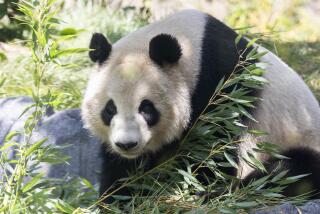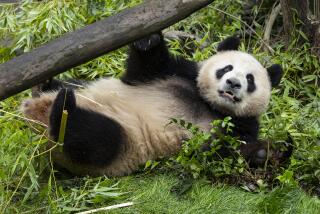Attack of the Pandas
WOLONG NATURE RESERVE, China — Taiwan and China quibble about everything from diplomatic slights and hidden meanings to ancient history and obscure definitions. So perhaps it’s not surprising that they’d argue over two chubby animals that bite each other’s ears and have trouble procreating.
China’s latest weapon in its increasingly effective charm offensive against Taiwan is an offer of giant pandas. Who would think of turning down two lovable animals that zoos around the world can only dream about, you might ask?
The government of archrival Taiwanese President Chen Shui-bian, for one, which finds itself tied in knots over the offer. Let one panda’s nose in the tent, Chen and his allies fear, and you buy into Beijing’s claim that Taiwan is part of China, a notion impossible for the pro-independence government on the island to accept.
“The pandas are a trick, just like the Trojan horse,” said lawmaker Huang Shi-cho of the Taiwan Solidarity Union party. “Pandas are cute, but they are meant to destroy Taiwan’s psychological defenses.”
Unfortunately for the Chen camp, most Taiwanese appear happy to have their psychological defenses destroyed by an animal that has melted hearts for centuries. One poll found that more than 70% are in favor of accepting the gift.
“We’d love to have them come to Taiwan,” said Zhang Hong-yu, a 32-year-old factory worker from Hsinchu, who traveled to see the furry celebrities here in Wolong, a nature reserve and panda research center deep in the bamboo-laden mountains of central Sichuan province. “We don’t care about politics. I’d love to jump over the fence and hug them!”
China has played its hand masterfully, seizing the public relations advantage at every turn with a deftness that would put Madison Avenue to shame. It announced the offer during a visit to China last year by a pro-Beijing Taiwanese opposition leader, a historic rapprochement that already had Chen reeling.
Driving its advantage home, Beijing has turned each step into a media extravaganza, with news about various “trial marriages” between panda candidate pairs and details about their personalities, DNA, hobbies (tree climbing) and, according to state media, the “language lessons” they received in Taiwan’s Minnan dialect.
China, a nation that doesn’t vote for its leaders, encouraged millions to vote for the pandas, or at least their names, announcing the choice of “Tuan Tuan” and “Yuan Yuan” -- a play on “unify” -- before hundreds of millions of Chinese New Year TV viewers. Chen, whose government is expected to make a decision whether to accept them by early April, quickly suggested they be renamed “independence” and “nation-building.”
“Peaceful pandas vs. bellicose Chen,” screamed a headline in the China Daily, the English-language Communist Party newspaper distributed in China.
Chinese panda diplomacy dates at least as far back as the Tang Dynasty, when Empress Wu Zetian (624-705) gave a pair to Japan’s emperor as a goodwill gift. But it reached its zenith in 1972, when President Nixon made his landmark trip to China, landing a pair of pandas that went a long way toward humanizing the isolated Communist state.
“At the height of Mao’s panda diplomacy, they were involved in more foreign peace overtures than [Henry] Kissinger,” Frank McNally wrote recently in the Irish Times. In retrospect, he added, perhaps the animals rather than the former secretary of State should have received the controversial 1973 Nobel Peace Prize.
Beijing’s latest offer of pandas, known as xiongmao or “bearcat” in Chinese, is part of a recent campaign some term “united-front tactics.” After years of threatening Taiwan’s leadership, lobbing missiles in the island’s direction and enshrining into law their willingness to use force against the island to bring it to heel, the Communists made a strategic shift in the spring of 2005 by actively appealing to Taiwanese interest groups and trying to weaken Chen’s hand.
Since then, Taiwanese farmers, businesspeople, travel agents and students have been offered market access, reduced tuition on the mainland and other perks. Chen, who seems more comfortable staring down missiles than dealing with “acts of kindness,” has often waffled, making him appear flat-footed and churlish at times.
In an attempt to counter Beijing’s naming contests and catchy sound bites, the Chen administration has trotted out the 1963 Convention on International Trade in Endangered Species of Wild Fauna and Flora. Any transfer, it argues, must comply with the accord on a “nation to nation” basis.
“China should not be so afraid of the word ‘international,’ ” said Cho Jung-tai, Taiwan’s Cabinet spokesman. “Pandas deserve human rights too.”
Although the argument has sparked a fresh round of recriminations over whether the pandas would cross national, or provincial, boundaries, it’s won Chen few points in the PR arena.
Then again, China has lots of practice, having scored the diplomatic equivalent of a grand slam with its gift of a panda pair to the United States after Nixon’s visit.
“It was a very deft move by the Chinese leadership,” said Chas Freeman, Nixon’s interpreter on the trip.
In return, the Americans sent back a pair of musk oxen. “We took them to the cleaners on that trade,” Freeman said.
About 20,000 people visited Ling-Ling and Hsing-Hsing on their first day at Washington’s National Zoo that April, part of the 1.1 million visitors the first year. Nixon apparently never bothered. “He had a disdain for ceremony,” Freeman said.
As “panda-monium” raged, London decided it too wanted a pair. In 1974, it sent a delegation to Beijing headed by Prime Minister Edward Heath, but the timing never seemed right to broach the subject. Finally, near the end of the visit, Heath got up his nerve, realizing it was now or never.
“The Chinese cracked up,” said Michael Brambell, retired mammal curator at the London Zoo. “They told him: ‘We wondered when you’d get around to asking.’ ”
Brambell got a scare a few weeks later when picking up Chia-Chia and Ching-Ching. Some cog in the Communist hierarchy had left them sitting on the boiling tarmac for hours, and they were hyperventilating. They recovered after being rushed onto the air-conditioned plane.
Between 1958 and 1982, Beijing sent 23 pandas to nine countries. But soon international friendship alone wasn’t enough to seal a deal. Increasingly, cash was king. With zoos tripping over themselves for the furry prizes, China embarked on an increasingly controversial multiyear “rent-a-panda” program.
“In the 1980s, things became much more commercially oriented,” said David L. Towne, a consultant to the Los Angeles Zoo and head of the Giant Panda Conservation Foundation.
The lobbying frenzy, along with concerns over poachers, the pandas’ declining habitat and fears by animal rights groups that the endangered species would be loved out of existence, led in the early 1990s to a five-year U.S. ban on panda imports.
Only after safeguards were added was the ban lifted, with the San Diego Zoo an early beneficiary. A stipulation that fees be used for conservation in China was part of the deal.
Pandas are notoriously poor breeders, with a baby panda the ultimate zookeeper prize. On the flight from Beijing to Heathrow in 1974, Brambell recalls spending much of the time shining a flashlight on the animals’ private parts to establish that the two were actually male and female. “We wanted to make sure we really had the goods,” he said.
The species has earned the nickname “living fossils” for having an inefficient reproductive system, with captive males showing little interest in sex, and females in heat only a few days a year. Foreign scientists working with the Chinese have made advances in artificial insemination, while Chinese keepers have taken a different tack: panda “porn” videos to get them in the mood. “We never tried that,” Brambell said. “We were never that enterprising.”
State Forestry Administration figures released last year show the number of pandas in the wild in China has risen by more than 40% to 1,590 from 1,110 in the 1980s. About 160 are in captive breeding programs worldwide.
In the meantime, the reserve continues to wait for an answer from Taipei.
“It’s a fight over one-China pandas or two-China pandas,” said Jeffrey Bader, a former diplomat who worked on China issues during the 1970s and early 1980s days of panda diplomacy. “And no one is asking the pandas.”
Yin Lijin of The Times’ Beijing Bureau and special correspondent Tsai Ting-I in Taipei contributed to this report.
More to Read
Sign up for Essential California
The most important California stories and recommendations in your inbox every morning.
You may occasionally receive promotional content from the Los Angeles Times.










